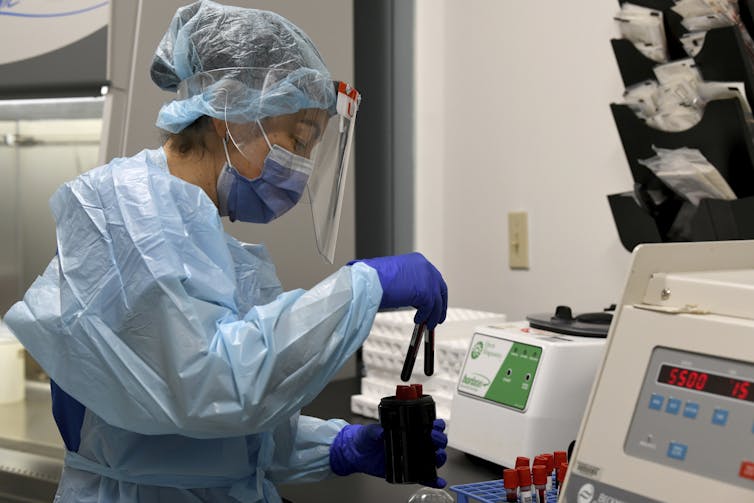Moderna's COVID vaccine reports 95% efficacy. It means we might have multiple successful vaccines
- Written by Magdalena Plebanski, Professor of Immunology, RMIT University
American biotech firm Moderna has released early results from its phase 3 clinical trials, announcing in a press release on Monday (US time) that its COVID vaccine has an efficacy of 94.5%, according to an “interim analysis” by an independent data and safety monitoring board.
Here’s how the percentage was calculated. First, there are two groups in the study: the vaccinated group, who received the candidate vaccine, and the placebo group, who received a shot of salt water.
Among 30,000 trial participants, 95 people developed COVID just in the one week after the final vaccination. But encouragingly, 90 of those positive cases occurred in the placebo group, and only five were in the vaccinated group.
While this is good news, many questions remain. We don’t yet know how long protection against the virus will last with this vaccine. We also don’t know for sure whether this vaccine is safe and effective in different types of people, such as pregnant women, the elderly, or those with a chronic illness.
Once a vaccine is deployed “in the real world”, we’ll start to understand its true effectiveness. In practice, this is likely to be different to its efficacy in highly controlled clinical trials.
Thus far, we can only say the Moderna vaccine prevents COVID symptoms, as only volunteers who developed symptoms in this trial were analysed. We don’t know for sure if it can prevent infection altogether.
Vaccines that control disease symptoms, rather than stopping infectious viruses from being transmitted from person to person, are valuable. But it is “transmission-blocking” vaccines that are most effective at rapidly reducing viral spread and have the highest chance of eliminating a pathogen from a population.
Moderna’s is easier to distribute
Like Pfizer’s vaccine, Moderna’s is an mRNA vaccine.
The company is co-developing it with the National Institute of Allergy and Infectious Diseases, part of the US federal health department.
The practical advantage Moderna appears to have over Pfizer is that its temperature requirements for distribution are simpler: 4℃ rather than -70℃. Storing and transporting a vaccine at 4℃ initially — the temperature of a household fridge — is much easier. By contrast, -70℃ freezers may only be found at major hospitals. For storage beyond 30 days the Moderna vaccine needs to be kept at -20℃, but even -20℃ freezers can be secured more easily.
 Moderna’s shot can remain stable at 4℃, and can be stored long-term at -20℃. Pfizer’s, meanwhile, needs to be stored at around -70℃.
Taimy Alvarez/AP/AAP
Moderna’s shot can remain stable at 4℃, and can be stored long-term at -20℃. Pfizer’s, meanwhile, needs to be stored at around -70℃.
Taimy Alvarez/AP/AAP
However, while both vaccines seem to induce neutralising antibodies against the SARS-CoV-2 “spike protein”, both report relatively poor induction of the other arm of the immune response: T cells that can target the virus, particularly those that can do it after the virus has hidden inside cells.
What’s more, neither vaccine has been shown to perform as well in older people compared to young adults. As a matter of fact, early phase 1 and 2 trials of the Pfizer vaccine saw the vaccine perform half as well in older individuals for antibody production.
Moderna’s latest human trial assessing safety and the vaccine’s ability to induce immune responses, which published final results in September after peer review, showed its vaccine induced the production of a similar amount of antibodies in adults under 70 years old, compared with those over 70. This is great news.
However, the shot induced significantly fewer T cells in adults over 71, particularly the type of T cells expected to be able to kill virus infected cells. Thus far, it’s not known whether this will result in less protection or less sustained immunity, but it is concerning this vaccine could be potentially less effective in older people.
Read more: Australia may miss out on several COVID vaccines if it can't make mRNA ones locally
We might end up with multiple successful vaccines
We now have two mRNA COVID vaccines with greater than 90% reported efficacy, according to early phase 3 trial results.
It’s great news that multiple vaccines in the pipeline are showing good results. It opens the door to the possibility we might have many successful vaccines, and be able to tailor different vaccines to people with different needs.
Read more: 90% efficacy for Pfizer's COVID-19 mRNA vaccine is striking. But we need to wait for the full data
There are still more than 200 COVID vaccine candidates, many of which use different processes and types of technology. Some of these will work better for different people, for example older people, pregnant women or people with chronic diseases.
For example, the “adenovirus” vaccines, of which the Oxford University vaccine is one, seems to be good at inducing T cells.
And the University of Queensland’s vaccine looks well placed to induce immune responses specifically in older people.
Tailoring different vaccines to different people will help us increase coverage and hopefully increases the likelihood we can eliminate this virus safely.
The Australian federal government has formed a key group, the Australian Technical Advisory Group on Immunisation for COVID, which will be able to advise on which vaccines might be best for which people.
Authors: Magdalena Plebanski, Professor of Immunology, RMIT University





